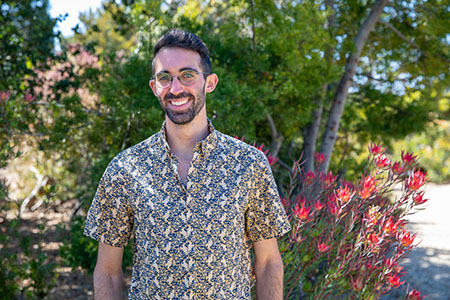Campus News
Neil Hardy: Generational health
Neil Hardy won’t likely stay in academia when he finishes his doctoral degree in electrical and computer engineering at UC Santa Cruz in the next couple of years. He would like to be an inventor or an entrepreneur in the health care technology sector. “I want to help people,” he said. “I want to improve […]

Neil Hardy won’t likely stay in academia when he finishes his doctoral degree in electrical and computer engineering at UC Santa Cruz in the next couple of years.
He would like to be an inventor or an entrepreneur in the health care technology sector.
“I want to help people,” he said. “I want to improve the health span of people for generations.”
Hardy is developing state-of-the-art brain-machine interface technologies that could eventually help people with neurodegenerative and neuropathic diseases such as Parkinson’s, Alzheimer’s disease, or dementia. He is developing biosensors for neurons that scientists can use to see many more neurons than they would otherwise be able to see. The technology provides “a level of detail not available with any other technology,” he explained.
Hardy’s research is not published yet, but he has shown the technology can be used with heart cells, which are a stepping stone to experimenting with neurons. He hopes that with time and more development the technology could eventually find its way to health clinics, which would be the real goal.
Originally from Birmingham, Ala., Hardy has been interested in science since he was a child. When he was only in 8thgrade, he was conducting his own experiments to test the Mpemba effect, which demonstrates that hot water can freeze faster than cold water. Science runs in Hardy’s family—his father is a pathologist and clinical chemist who teaches organic chemistry to dentistry and medical students, and his mother is a pharmacist.
“I was very obsessed with physics for a long time,” Hardy said. “When I got to undergrad, I double majored in physics and electrical engineering.”
Hardy started his doctoral degree at UC Santa Cruz in physics in 2017 and switched to electrical and computer engineering in 2019. He is grateful for the $10,000 scholarship he got from Achievement Rewards for College Students (ARCS) as well as other awards from the Chancellor Fellowship, which pays all university fees for incoming doctoral students in any discipline.
Hardy chose to make the cross-country move to come to UC Santa Cruz because he wanted to work in neuroscience and neurotechnologies and was impressed with what the university had to offer.
Then there’s the benefit of being close to Silicon Valley. He was able to listen to a panel discussion at UC Santa Cruz featuring graduates who became entrepreneurs.
“I liked that I got to get their feedback on what they saw the challenges were in being an entrepreneur specifically out of Santa Cruz,” Hardy said.
Ideally, he would like to begin his own startup right in Santa Cruz.
“There are a lot of bright ideas coming out of Santa Cruz,” he said. “What’s stopping getting them out is funding.”
It takes an enormous amount of capital to start the kind of high-tech businesses he and others are after.
Hardy is working on talking to investors and figuring out what he can do to stay in the natural beauty of Santa Cruz.
“I love it here,” he said. “I get to surf; I get to rock climb. The people just get me.”